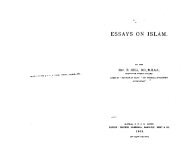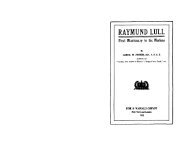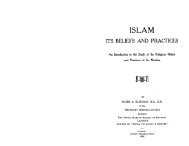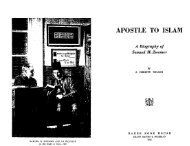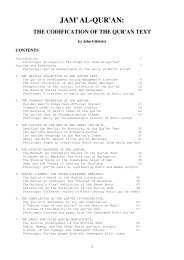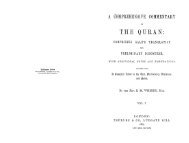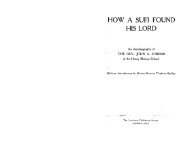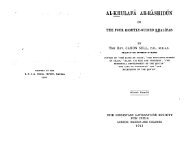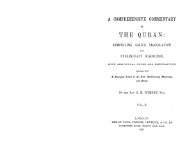Guillaume--Life of Muhammad.pdf - Radical Truth
Guillaume--Life of Muhammad.pdf - Radical Truth
Guillaume--Life of Muhammad.pdf - Radical Truth
You also want an ePaper? Increase the reach of your titles
YUMPU automatically turns print PDFs into web optimized ePapers that Google loves.
3°2<br />
206 The <strong>Life</strong> <strong>of</strong> <strong>Muhammad</strong><br />
young man, so give him back his sandals.' 'By God, I will. no~,' I said; lit is<br />
a good omen and if it proves to be true I shall plunder him.<br />
'Abdullah b. Abu Bakr told me that they came to 'Abdullah b. Ubayy<br />
and said to him much the same as Ka'b had said and he replied, 'This is a<br />
serious matter; my people are not in the habit <strong>of</strong> deciding a question wlth-,<br />
out consulting me in this way and I do not know that It has happened.<br />
Thereupon they left him.<br />
When the people had left Mina they investigated the report closely and<br />
found that it was true. So they went in pursuit <strong>of</strong> (our) people and overtook<br />
Sa'd b. 'Ubada in Adhakhir and also al-Mundhir b. 'Amr, brother <strong>of</strong><br />
B. Sa'ida, both <strong>of</strong> them being 'leaders'. The latter got away, but they<br />
caught Sa'd and tied his hands to his neck with the thongs <strong>of</strong> the gIrth<br />
and brought him back to Mecca beating him o,n th~ w~y and draggmg h,m<br />
by the hair for he was a very hOlry man. Sa d said, As they held me, a<br />
number <strong>of</strong> Quraysh came up, among them a tall, white, handsome man <strong>of</strong><br />
pleasant appearance and I thought that if there was any dec~ncy among<br />
them this man would show it. But when he came up he dehvered me a<br />
violent blow in the face and after that I despaired <strong>of</strong> fair treatment. As<br />
they were dragging me along, a man took pity on me and said, "You poo,~<br />
devil haven't you any right to protection from one <strong>of</strong> the Quraysh?<br />
"Yes:" I said, "I have. I used to guarantee the safety <strong>of</strong> the merchants <strong>of</strong><br />
Jubayr b. Mufim b. 'Adiy b. Naufal b. 'Abdu Manilf and protect th~m<br />
from those who might have wronged them m my country; also al-I;lAnth<br />
b. I;Iarb b. Umayya b. 'Abdu Shams b. 'Abdu Manaf." ".v ery well, the~:<br />
callout the names <strong>of</strong>these two men and say what tie there IS between.you,<br />
he said. This I did and that man went to them and found them.m the<br />
mosque beside the Ka'ba and told them <strong>of</strong> me and that I was calhng for<br />
them and mentioning my claim on them. When they h~ard who I, was th~y<br />
acknowledged the truth <strong>of</strong> my claim and came and dehvered me. So Sa d<br />
went <strong>of</strong>f. The name <strong>of</strong> the man who hit him was Suhayl b. 'Amr, brother<br />
<strong>of</strong> B. 'Amir b. Lu'ayy (244)'<br />
. _<br />
The first poetry about the Migration was two verses composed by I;>lrar<br />
b. al-Khattab b. Mirdas, brother <strong>of</strong> B. Mu~anb b. Flhr:<br />
I overtook Sa'd and took him by force.<br />
It would have been better if I had caught Mundhir.<br />
If I had got him his blood would not have to be paid for.<br />
He deserves to be humiliated and left unavenged (24{Q).<br />
I;Iassiln b. Thiibit answered him thus:<br />
You were not equal to Sa'd and the man Mundhir<br />
When the people's camels were thin.<br />
But for Abu Wahb (my) verses would have passed over<br />
The top <strong>of</strong> al-Barqa" swooping down swiftly'<br />
I Yiiqut says that this is a place in the desert. He does ~ot s~y where,_<br />
~ The interpretation <strong>of</strong> this difficult line depends on the identIty <strong>of</strong> Abu Wahb. The man<br />
The <strong>Life</strong> <strong>of</strong> <strong>Muhammad</strong><br />
Do you boast <strong>of</strong> wearing cotton<br />
When the Nabataeans wear dyed' wrappers?<br />
Be not like a sleeper who dreams that<br />
He is in a town <strong>of</strong> Caesar or Chosroes.<br />
Don't be like a bereaved mother who<br />
Would not have lost her child had she been wise;<br />
Nor like the sheep which with her forelegs<br />
Digs the grave she does not desire;<br />
Nor like the barking dog that sticks out his neck<br />
Not fearing the arrow <strong>of</strong> the unseen archer.<br />
He who directs poetry's shafts at us<br />
Is like one who sends dates to Khaybar.'<br />
THE IDOL OF 'AMR IBNU'L-J AMi'r1;l<br />
When they came to Medina they openly pr<strong>of</strong>essed Islam there. Now some<br />
<strong>of</strong> the shaykhs still kept to their old idolatry, among whom was 'Amr b.<br />
al-Jamu~ b. Yazid b. I;Iaram b. Ka'b b. Ghanm b. Ka'b b. Salama whose<br />
son, Mu'adh, had been present at al-'Aqaba and had done homage to the<br />
apostle there. 'Amr was one <strong>of</strong> the tribal nobles and leaders and had set<br />
up in his house a wooden idol called Manat' as the nobles used to do,<br />
making it a god to reverence and keeping it clean. \Vhen the young men <strong>of</strong><br />
the B. Salama Mu'adh b. Jabal and his own son Mu'adh adopted Islam<br />
with the other men who had been at al-'Aqaba they used to creep in at<br />
night to this idol <strong>of</strong> tAmr's and carry it away and throw it on its face into<br />
a cesspit. When the morning came tAmr cried, 'Woe to you! Who has<br />
been at our gods this night?' Then he went in search <strong>of</strong> the idol and when<br />
he found it he washed it and cleaned it and perfumed it saying, 'By God,<br />
if I koew who had done this I would treat him shamefully!' When night<br />
came and he was fast asleep they did the same again and he restored the<br />
idol in the morning. This happened several times until one day he took<br />
the idol from the place where they had thrown it, purified it as before, and<br />
<strong>of</strong> this name mentioned by r.r. (p. 123) was the father <strong>of</strong> the prophet's maternal uncle; if it<br />
is he that is referred to, clearly the meaning must be that the presence <strong>of</strong> this man in Mecca<br />
prevented Bassan from launching his invective against Quraysh, and the verb must mean<br />
swooping or rushing. However, al-Barquqi in his commentary on the Diwan tentatively<br />
suggests that it was Abu Wahb who brought Dirar's lines to Medina: had he not done so<br />
they would have fallen impotently on the way. This interpretation requires us to understand<br />
hawa in the sense <strong>of</strong> falling, and Qltssuni as 'wearied' instead <strong>of</strong> 'stripped for action' and so<br />
capable <strong>of</strong> rapid movement. The last line in 1.1.'s text follows this line and this rearrangement<br />
<strong>of</strong> the lines would naturally suggest that the qasd'id came from the same source; but<br />
as 1.1. reported the satire such a conclusion is unnecessary. See further Dr. Arafat's thesis<br />
on the poetry <strong>of</strong> I;Iassan. I Or 'bleached'.<br />
:I i.e. Sends coals to Newcastle. This line follows line 2 in the Diwdn.<br />
3 Suhayli explains that the idol was so called because blood was shed (muniyat) by it as<br />
an <strong>of</strong>fering and that is why idols are said to be bloody. But the explanation <strong>of</strong> the name is<br />
to be found outside the Arabic language in the goddess <strong>of</strong> fate. See S. H. Langdon, Semitic<br />
Mytholog}', 1931, pp. 19 ff.<br />
2°7<br />
3°3



